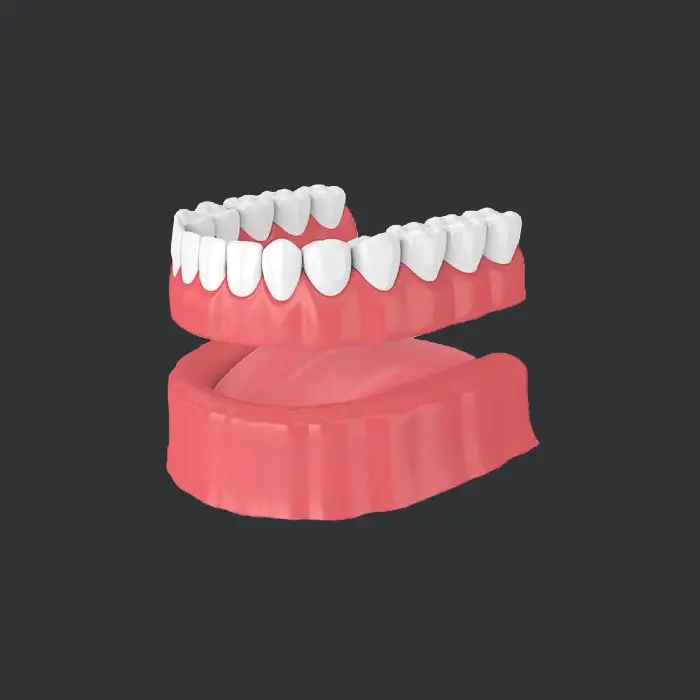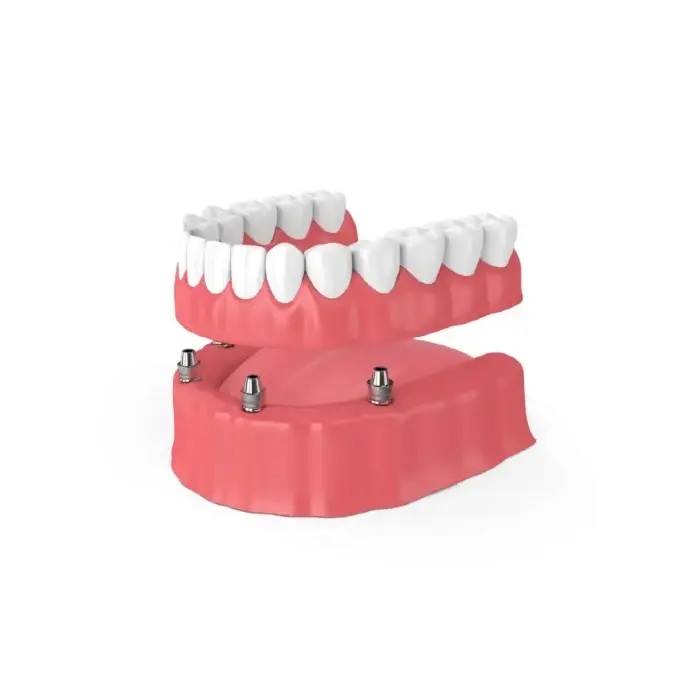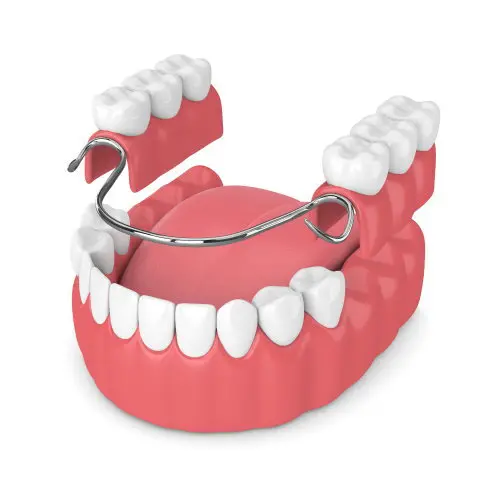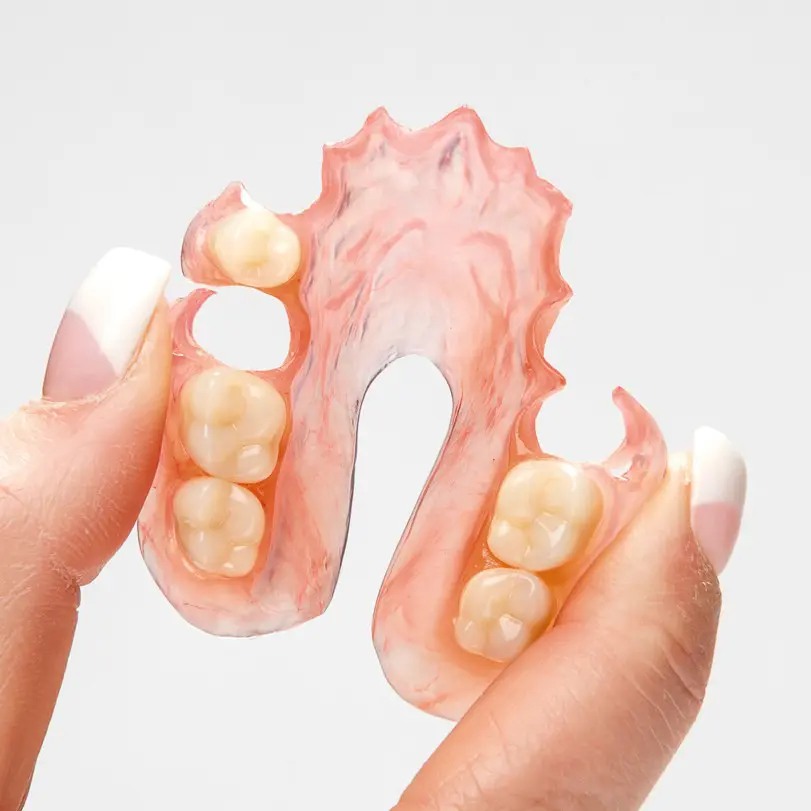Having a beautiful and confident smile is important for all patients. Restoring your smile with high-quality dentures gives you control over your life again. Stop letting tooth loss rob you of your confidence and health – schedule your FREE Dentures Consultation today by calling our Smile Now Boise Dentures & Implants team at (208) 792-6473.

Traditional Dentures are made after the teeth have been removed and the tissue has healed (usually about 6 months after the last tooth was removed).
Immediate Dentures are delivered to the patient the same day the teeth are removed. They often require adjustments over the first several months of use and are usually relined after the tissue has healed (6-12 months after the teeth were removed).

Snap-In Dentures (also called Click-In Dentures or Overdentures) are a cost-effective alternative to traditional dentures that utilizes strategically placed implants for added retention.
Snap-In Dentures are removable by the patient for easy cleaning, but offer superior stability when compared to conventional dentures.
Dental implants can eliminate the need for the palate portion of top dentures (the part that covers the roof of the mouth), thus helping to reduce gagging sensations and diminished ability to taste food. Snap-In Dentures can also make a loose lower denture more stable, keeping it from floating around in your mouth.
Snap-In Dentures can help to increase your confidence, comfort, and function, thereby greatly increasing your quality of life.
Removable partial dentures are great when you need an affordable option to help replace several missing teeth in either the upper or lower arch. A partial has replacement teeth connected to a gum-colored plastic base that often has a cast metal framework. Partial dentures can help keep your other teeth from shifting, allow you to speak and eat better, and help support your cheeks and lips so your face does not appear older and sunken in.

Cast Metal Partial Dentures slide over your existing teeth to help fill any gaps you may have. They are custom-made by expertly trained technicians, fit securely in place, and are very durable.

Flexible Base Partial Dentures (also called Valplast partials) use a state-of-the-art technology to create a lightweight, metal-free partial denture. Each appliance is handcrafted to help ensure a natural look and feel with increased flexibility and comfort.
Our pricing for dentures is $1,999 per arch. This is the lowest price in the area while also providing the best final result. At Smile Now Boise Dentures & Implants, you can come into our office and leave with a new set of high-quality dentures after just two appointments. Our denture pricing includes:
Dentures are an important investment in yourself. Having the option to break this investment down into monthly payments can help make these life-changing services more accessible and easier to fit into your budget. We work with a variety of financing providers who offer payment plans to cover either all or part of your procedure. This is a great option for all patients, especially those who are on a fixed income. With these flexible financing options, you can enjoy the benefits of a healthy, beautiful smile without breaking the bank.
Contact us to learn more about our financing options and schedule your FREE Consultation with Dr. Stott today!
Longer-term options for lower payments (up to 96 months)
Online applications, limited information required, and instant decisions in most cases

Interest-free up to 6 months
Longer-term options for lower payments (up to 60 months)
Option to apply with a co-applicant increases chance of approval
Dentures require daily maintenance in order to keep them clean and looking nice for years to come. If you do not properly care for your denture it can harbor bacteria and become permanently stained.
Be careful when cleaning your denture in the sink. Setting out a folded towel or filling the sink with water prior to handling them can help prevent your dentures from breaking if you accidentally drop them.
Utilize a mild cleanser to help clean your denture. Many cleaners are too abrasive and can damage your appliance. We recommend you always ask your dentist what they recommend or check for the American Dental Association (ADA) seal of approval when determining which products to use.
Your dentures need to be kept moist when you are not wearing them. We recommend you keep them in a cleaning solution or water to help prevent them drying out or losing their shape.
Even if you have a complete set of dentures (top and bottom), it is very important that you clean your tongue and gums daily and schedule regular dental checkups to ensure that your smile stays healthy.
Dentures are removable prosthetic devices that are used to replace missing teeth and surrounding tissues. They can be used to replace all the teeth in the upper or lower jaw (complete dentures) or only a few missing teeth (partial dentures).
The process of getting dentures typically involves a couple appointments to take impressions of your mouth, make models of your teeth, and create the final dentures. Dr. Stott will also work with you to select the size, shape, and color of your denture teeth to ensure a natural-looking and comfortable fit.
After the dentures are placed, you may experience some discomfort or difficulty speaking and eating, but these issues typically resolve with time and practice. It’s important to follow Dr. Stott’s instructions for cleaning and caring for your dentures to maintain their function and appearance.
Yes, there are several different types of dentures available, and the best type of dentures for you will depend on your individual needs and preferences.
Here are some of the most common types of dentures:
The best type of dentures for you will depend on factors such as the number and location of missing teeth, your oral health, your budget, and your personal preferences. Dr. Stott can help you determine the best type of dentures for your individual needs and circumstances. We will also discuss the pros and cons of each type of denture to help you make an informed decision.
The lifespan of dentures can vary depending on a few factors, such as the type of dentures, how well they are cared for, and changes in the mouth over time. In general, dentures should be replaced every 5 to 10 years.
Over time, dentures can become worn, stained, or misaligned, which can cause discomfort and difficulty with eating and speaking. Additionally, as the mouth changes due to bone loss, the fit of the dentures can become loose, which can also cause discomfort and make it difficult to chew and speak properly.
It’s important to have regular check-ups with a denturist to ensure that your dentures are fitting properly and to address any issues that may arise. If you’re experiencing discomfort or difficulty with your dentures, give Smile Now Boise Dentures & Implants a call or schedule an appointment online today and we’ll get you in right away!
The cost of traditional dentures can vary depending on a few factors, such as the type of dentures, the materials used, and any additional services that may be required. Click here to view our dentures cost.
The cost of dentures may not be covered by insurance, or may only be partially covered. We recommend that you check with your specific insurance provider to see if you have coverage for dentures. At Smile Now Boise Dentures & Implants, we offer financing options which spread out your payments and help fit dentures into your budget.
Yes, temporary dentures are designed to allow you to eat and speak during the transition period while your permanent dentures are being made. However, there are some limitations to what you can eat with temporary dentures.
Temporary dentures are typically made of acrylic, which is not as strong as the materials used for permanent dentures. Therefore, it’s important to avoid hard or sticky foods that could damage or dislodge the temporary dentures. Some examples of foods to avoid include hard candy, nuts, popcorn, and chewing gum.
Instead, it’s best to stick to softer foods that are easier to chew, such as cooked vegetables, soft fruits, and well-cooked meats. You may also want to cut your food into smaller pieces and chew on both sides of your mouth to distribute the pressure more evenly.
It’s important to follow any specific instructions provided by Dr. Stott regarding caring for and using your temporary dentures while you wait for your permanent dentures to be made.
Temporary dentures are designed to be a short-term solution while your permanent dentures are being made. The lifespan of temporary dentures can vary depending on a few factors, such as the type of denture, how well they are cared for, and how long they need to be worn.
In general, temporary dentures can last anywhere from a few weeks to a few months. They are not meant to be a permanent solution and are not as durable as permanent dentures. Over time, temporary dentures may become loose or uncomfortable as the gums and bone heal and change shape following tooth extraction.
It’s important to follow any specific instructions provided by Dr. Stott regarding caring for and using your temporary dentures while you wait for your permanent dentures to be made. This can help ensure that they last as long as possible and that your transition to permanent dentures is as smooth and comfortable as possible.
Our patients are our biggest fans. Here are a few highlights from our public reviews.
Monday
8:00AM – 5:00PM
Tuesday
8:00AM – 5:00PM
Wednesday
8:00AM – 5:00PM
Thursday
8:00AM – 5:00PM
Friday
8:00AM – 5:00PM
Saturday
CLOSED
Sunday
CLOSED